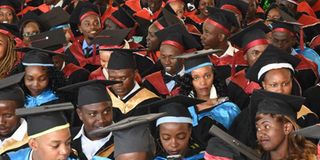Varsity students face delays as lockdown disrupts exams

A past graduation ceremony at Moi University in Eldoret.
What you need to know:
- Some universities are still struggling to offer online examinations
- Others have not had their programmes accredited by Commission for University Education (CUE).
Students in colleges and universities are staring at a crisis following the suspension of physical learning to curb the spread of Covid-19.
Although most universities and colleges have shifted to online learning, some are still struggling to offer online examinations while others have not had their programmes accredited by the Commission for University Education (CUE).
Some students in remote areas have also been unable to access online lessons due to poor internet connection. This has caused thousands of students to lag behind in their studies while others have failed to graduate on time.
This is despite universities conducting virtual graduations.
At the University of Nairobi, which normally holds two graduation ceremonies every year, most students did not complete their studies on schedule.
The UoN Head of Communication John Orindi in an interview said the university graduated only 2,851 students in September instead of the usual 5,000 in the previous years. The number of those who graduated in December also dropped from 10,000 to 5,010 students.
“In November, we brought in only first years to give them an experience of campus life and reverted to online classes,” he said.
Learning interrupted
Other universities such as Kenyatta, Moi, Chuka, Technical University of Kenya, Meru University of Science and Technology, Jomo Kenyatta University of Science and Technology among others also brought in first years but their learning was interrupted by the March lockdown.
Egerton University’s first year students joined in January and had not completed their first semester when physical learning was suspended for a second time.
The chair of Public Universities Vice-Chancellors Committee, Prof Geoffrey Muluvi, said universities have shifted to online learning to avoid a backlog.
“Unlike last year, universities have put in the right infrastructure and shifted classes online,” said Prof Muluvi, who is also the Vice-Chancellor of South Eastern Kenya University.
For the Kenya Accountants and Secretaries National Examination Board (Kasneb) students who were to sit their exams next week, their long hours of preparation did not pay off.
Kasneb Chief Executive Officer, Dr Nicholas K Letting’, said the suspension of physical learning has made them to postpone the exams scheduled for next week to mid-May.
“The April 2021 examination series has been rescheduled from next week to the week from 17 - 21 May 2021,” said Dr Letting.
Scheduled examination
Kasneb had this year scheduled examination three series in April, August and December 2021 to enable students to catch up and recover the time lost in 2020.
There are usually two exam series for Kasneb students annually.
“Last year, we missed the May 2020 series and combined it with the November one,” he said.
The CUE Chief Executive Mwenda Ntarangwi, yesterday said the commission is working with universities to ensure their courses are accredited for the Open, Distance and e-Learning to enable the institutions to continue with teaching.
“Approximately more than 80 per cent of universities have submitted self-assessment reports (SARS) of their readiness to offer e-learning but a few others are yet to,” said Mr Ntarangwi.
There are 73 universities in Kenya — 39 public and 34 private.
CUE provided universities with benchmarks that will be used to accredit online infrastructure to offer e-learning. The commission asked universities to send SARS.
Physical learning
President Uhuru Kenyatta suspended physical learning in schools, universities and colleges last month as one of the measures intended to curb the spread of Covid-19.
This was the second time the President announced the closure of physical learning.
Most universities and colleges had opened for physical learning in November last year after an eight-month break while some opened for their first semester in January and had not completed the semester when physical learning was discontinued.
In several other universities, learners had taken a week’s break and resumed for the second semester. Others were set to resume early April.
The programmes which universities were offering before the Covid-19 pandemic were only approved for one-on-one learning. They could not therefore be deemed to have been accredited for the blended learning.
Technical and Vocational Education Training (Centres) and private colleges have also been struggling to complete their courses in time.
Final year students who were to sit their Kenya National Examination Council examinations in July last had their exams postponed due to the pandemic.





